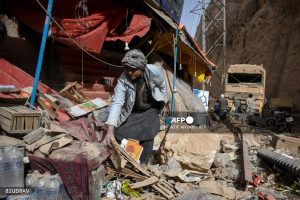Sad: Girl Child Dreams Faces Jeopardy In Afghan 1

“I want” – the girl stops herself – “I wanted to be a doctor in the future. But when the Taliban came to Afghanistan, all the doors of schools were closed.”
Inside the Taliban-approved Naji-e-Bashra madrasa – a girls-only religious school on the outskirts of Kabul – a teenage girl wearing a full face covering speaks nervously. Her classmate grabs her arm beneath the table, aware that any criticism of the ruling Taliban government is ill-advised.
Imperfect though these religious institutions are, they are the only option for most Afghan girls over the age of 12 who want any education. Afghanistan remains the only country in the world that prohibits girls and women from getting general education at secondary and higher levels.
The ban is part of a wide-ranging crackdown on women’s rights by the Taliban since they swept to power in August 2021. The government dictates how women must dress, where they can and cannot go, and with whom they must go – for example, that they must have a male guardian with them for travel.
READ ALSO: Trump removes US from UNESCO for 2nd time
In July this year, the International Criminal Court sought arrest warrants for two of the top Taliban leaders, citing the persecution of women and girls as evidence of crimes against humanity. The Taliban denounced the court as showing “enmity and hatred for the pure religion of Islam.”
ICC Weighs In To Fight For The Girl Child
The Taliban had originally stated that the suspension of female education would be temporary, and some leaders said that they wanted mainstream schools to reopen once security issues were resolved. But four years on, the fundamentalist wing of the Taliban seems to be winning. Non-religious schools, universities and even healthcare training centers remain closed off to half the population. According to a report published in March by UNESCO, a United Nations agency, nearly 1.5 million girls have been prohibited from attending secondary school since 2021.
“We told girls to wear proper hijabs but they didn’t. They wore dresses like they’re going to a wedding ceremony,” said the acting Minister of Higher Education Nida Mohammad Nadim in December 2022, on state TV, explaining why the schools were closed. “Girls were studying agriculture and engineering, but this doesn’t match Afghan culture. Girls should learn, but not in areas that go against Islam and Afghan honor.”
Meanwhile, the number of madrasas educating girls and boys across Afghanistan has grown sharply. According to data from the Ministry of Education, 22,972 state-funded madrasas have been established over the past three years.
At the Naji-e-Bashra madrasa, where CNN gained rare access to film in recent weeks, enrolment has skyrocketed since the Taliban began depriving girls of a “mainstream” education.
As the sound of dozens of girls reciting Quranic verses echoes down the hallways, golden-lettered Qurans and religious texts are stacked up on classroom floors. In the principal’s office, a large Taliban flag is propped in a corner. A certificate stamped by the Taliban’s Ministry of Education sits in the center of the principal’s desk. The Taliban dictate the curriculum here – along with all madrasas across the country.
Because this is a private facility, funded by parents of students who generally live a more privileged life, staff are given slightly more leeway to also teach languages and science alongside Islamic studies. In public madrasas, which are funded by the Taliban government, the curriculum is almost entirely religious in content.
In 2022, the Taliban announced their plans for the school curriculum, setting out many changes that according to a report by the Afghanistan Human Rights Center, a human rights monitoring group, “not only fail to meet the human development goals of international human rights instruments, but also teach students content that promotes violence, opposes the culture of tolerance, peace, reconciliation, and human rights values.”






